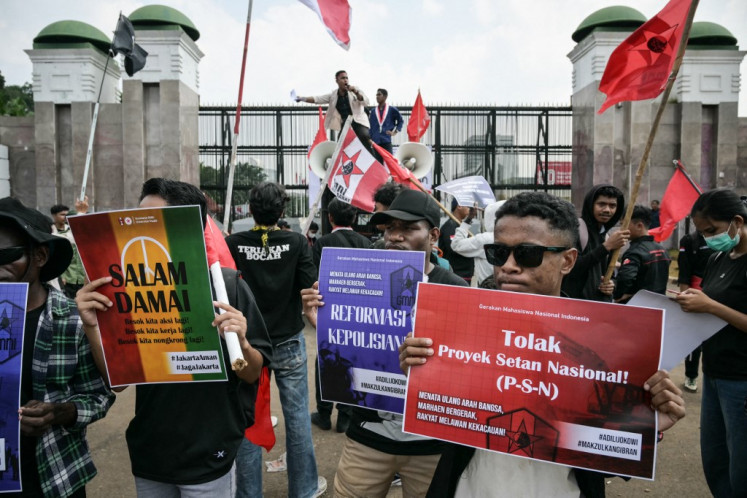Popular Reads
Top Results
Can't find what you're looking for?
View all search resultsPopular Reads
Top Results
Can't find what you're looking for?
View all search resultsGovt to revert to palm oil DMO after lifting ban
Policy was discontinued in March, brought back to stabilize domestic cooking oil prices.
Change text size
Gift Premium Articles
to Anyone
T
he government has decided to bring back the domestic market obligation (DMO) policy for palm oil, in the hope of stabilizing domestic cooking oil prices after it lifts an export ban on the commodity.
Coordinating Economic Affairs Minister Airlangga Hartarto said on Friday the government aimed to accumulate 10 million liters of cooking oil through the DMO, a fifth of which would act as reserves. Producers must supply the products at government-set prices, also known as the domestic price obligation (DPO).
The minister did not specify which type of palm oil products would be subject to the new DMO.
“Producers who do not fulfill DMO obligations or do not distribute to the community as mandated by the government will be punished in accordance with the rules,” Airlangga told reporters in an eight-minute video statement.
The announcement came a day after President Joko "Jokowi" Widodo announced plans to lift an export ban on palm oil on May 23, the first step in undoing a three week-long policy that shook global markets.
The export ban was one of the government's many strategies to bring down cooking oil prices to Rp 14,000 (96 US cents) per liter amid surging global crude palm oil (CPO) prices, but prices of the staple food product stayed at between Rp 17,000 and Rp 18,000 in many parts in Indonesia, even after the ban.
Prior to the export ban, the government implemented a DMO and DPO policy for palm oil from January to March. The policies required producers to sell at least 20 percent of their output in the domestic market at less than Rp 9,300 per kilogram for CPO and Rp 10,300 per kg for olein. The policy was scrapped after it failed to address the cooking oil shortage.
The government then introduced the export ban on all palm oil products in April 28. The ban caused outcry from smallholders, whose incomes dropped as domestic fresh fruit bunch (TBS) prices crashed. Smallholders also called on the government to enforce regulated TBS prices on companies.
Read also: Indonesia to lift cooking oil export ban
Upcoming policies
Airlangga said the Trade Ministry, in coordination with the Finance Ministry and Industry Ministry, was working on the regulation to officially lift the export ban.
The Trade Ministry is also working on regulations to implement the DMO, including the amount of palm oil each producer needs to supply to meet the DMO target.
The government will also tighten control over the distribution of cooking oil by requiring buyers to show their citizenship identity cards (KTP) when buying the product in traditional markets, and will require producers to purchase TBS from farmers at certain regulated prices.
The government will assign the State Logistics Agency (Bulog) to establish a cooking oil reserve amounting to 10 percent of total domestic demand, hoping it can accelerate distribution and stabilize prices. Total demand is estimated at 194,000 tons per month.
Airlangga said regulators would deliver more details before May 23.
Read also: Palm oil farmers plan second street protest over export ban
Market response
RHB Securities Indonesia analyst M. Wafi said on Friday that investors showed a positive response to the lifting of the export ban on palm oil.
The Indonesia Stock Exchange (IDX) Composite rose by 0.23 percent to 6,839 on Friday’s opening, then rose again to 6,965 an hour later, as the removal of the ban on palm oil – Indonesia's second-biggest export commodity after coal – eased worries surrounding Indonesia's trade balance.
Publicly listed palm oil producers Astra Agro Lestari (AALI), PT PP London Sumatra Indonesia (LSIF), Triputra Agro Persada (TAPG) and Provident Agro (PALM) all saw around a 5 percent increase in their share prices as of 2 p.m. on Friday, as the companies stood to benefit from resuming exports amid high global CPO prices.
However, lifting the ban might not fully remove all investors’ worries, Wafi said, as the government still needed to prove there would be no more policy flip-flops in the future.
“It will remain a concern in the future. Investors will see whether there is another ban or not, including a possible spill over to other commodities. Market [players] would prefer stability over either one,” Wafi said.
Private lender Bank Permata chief economist Josua Pardede said on Thursday that lifting the export ban would help reduce the revenue loss in the state budget, which the Finance Ministry estimates will amount to Rp 6 trillion for a full-month ban
“We hope the export ban will not affect the budget deficit and revenue that much. But it is clear that the ban is less than a month long,” Josua told the Post.
Similarly, lifting the ban is expected to be a positive sign for the rupiah exchange rate. Samuel Securities estimated on April 30 that a full ban on CPO product exports would deprive the country of up to $3 billion a month in CPO exports, which leaves the rupiah vulnerable to expected United States Federal Reserve rate hikes in the coming months.
“We predict a positive impact from the government’s decision to revoke the CPO and palm olein export ban on the rupiah, which has been under severe depreciation pressure and reached Rp 14,733 per US dollar yesterday,” Samuel Securities macro equity strategist Lionel Priyadi said in a report on Friday.










